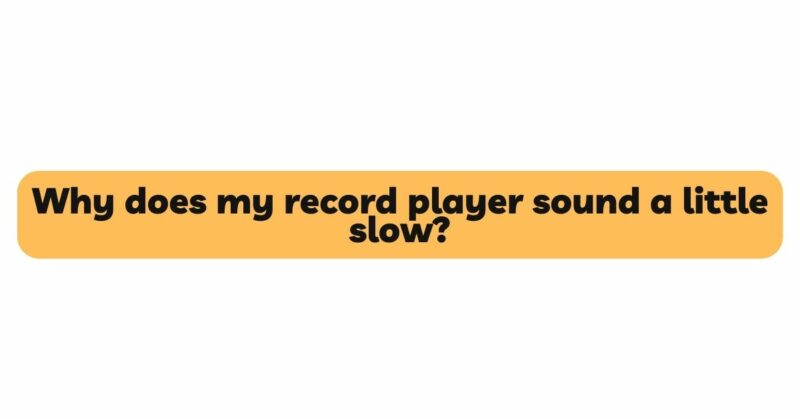The captivating world of vinyl records and turntables holds a unique place in the hearts of audiophiles and music enthusiasts. However, encountering a slow-paced playback on your cherished record player can be disheartening. The phenomenon of a record player sounding slightly slow can be attributed to various factors, ranging from mechanical to environmental influences. In this article, we delve into the intricacies of why your record player might sound a little slow. We explore the underlying causes, the impact on your listening experience, and potential solutions to restore the rhythmic cadence that defines vinyl playback.
Understanding the Anomaly: Slow Playback on Record Players
Playback speed is a cornerstone of accurate and enjoyable vinyl listening. When your record player sounds a tad slow, it often indicates a deviation from the intended rotation speed. The two primary speeds for record playback are 33⅓ revolutions per minute (RPM) for LPs and 45 RPM for singles. Any deviation from these standard speeds can lead to pitch inaccuracies, tonal distortions, and a compromised listening experience.
Causes of Slow Playback
- Belt Tension: In belt-driven turntables, the belt connecting the motor and platter can stretch over time, leading to decreased tension and consequently slower rotation.
- Motor Issues: Mechanical issues with the motor, such as friction or wear, can result in reduced rotation speed.
- Environmental Factors: Fluctuations in temperature and humidity can impact the elasticity of the belt, causing it to expand or contract and affect speed.
- Electrical Problems: In direct-drive turntables, electronic components responsible for speed control might malfunction, leading to speed inconsistencies.
- Lubrication: In direct-drive turntables, inadequate lubrication of the motor’s moving parts can impede its performance, affecting rotation speed.
- Stylus Pressure: Excessive stylus pressure can create additional friction between the stylus and the groove, causing a slight slowdown in rotation.
- Belt Aging: Over time, the belt in belt-driven turntables can degrade, losing its elasticity and affecting speed accuracy.
Impact on Listening Experience
A record player sounding slightly slow can have several negative effects on your listening experience:
- Pitch Variation: Slower playback alters the pitch of the music, resulting in vocals and instruments sounding lower than intended.
- Tonal Distortion: The timbre and tonal characteristics of the music can be altered, leading to a lack of clarity and unnatural sound.
- Groove Tracking Issues: Slow playback can cause the stylus to mistrack or skip, leading to disruptions in audio and potential record wear.
- Listening Fatigue: Prolonged exposure to slow playback can lead to listening fatigue as your brain tries to compensate for the pitch and timing discrepancies.
Solutions and Troubleshooting
- Belt Inspection and Replacement: For belt-driven turntables, inspect the belt for signs of wear, cracks, or elongation. Replace the belt if necessary to restore proper tension.
- Motor Maintenance: Lubricate the motor’s moving parts according to manufacturer guidelines to ensure smooth operation and consistent speed.
- Electrical Checks: For direct-drive turntables, verify that the electronic components responsible for speed control are functioning properly.
- Stylus Pressure Adjustment: Ensure that the stylus pressure is within the manufacturer’s recommended range to minimize friction and allow proper rotation.
- Temperature and Humidity Control: Maintain a stable environment for your turntable to prevent fluctuations in belt tension due to temperature and humidity changes.
- Professional Inspection: If the issue persists or if you’re unsure about performing repairs, seek professional inspection and servicing from experienced technicians.
Conclusion
The phenomenon of a record player sounding slightly slow can be a perplexing challenge for vinyl enthusiasts. Understanding the causes, implications, and potential solutions is essential for restoring the authentic vinyl experience that brings music to life. By delving into the mechanics of turntable operation, conducting regular maintenance, and addressing specific issues that contribute to slow playback, you can navigate this challenge and ensure that your record player once again becomes a faithful conduit for the melodies and emotions captured within each groove.


